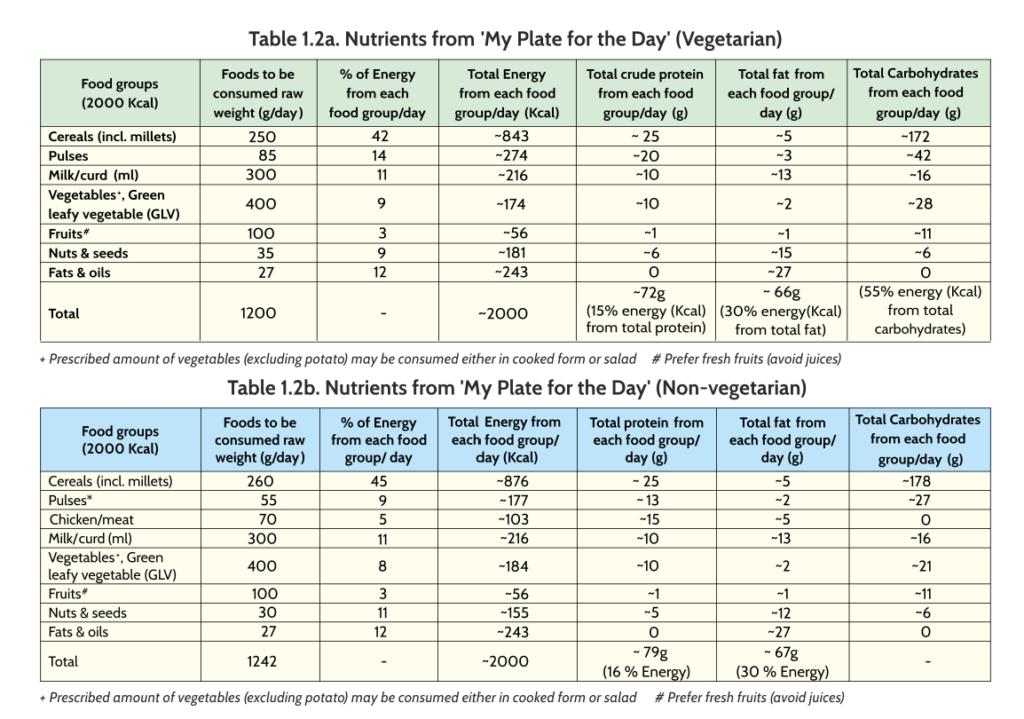
Rainbow on Your Plate – How Diverse Foods Lead to a Balanced Diet
Balanced diet
Introduction
A balanced diet is crucial for maintaining good health as it provides all the essential nutrients required by the body. Nutrition plays a vital role from conception through old age, influencing growth, learning, and reducing the risk of chronic diseases. Ensuring optimal nutritional status in the first 1000 days of life is particularly important for long-term health benefits.
Eating a variety of foods helps prevent nutritional deficiencies and non-communicable diseases. A diverse diet prevents undernutrition and micronutrient deficiencies like anaemia while minimizing the risk of diabetes, cardiovascular diseases, and obesity. The benefits of eating a variety of foods include a positive impact on overall health and well-being.
Different food groups offer unique nutrients essential for meeting our dietary needs. Whole grains and millets provide energy, pulses and legumes are rich in protein, and vegetables and fruits supply vital vitamins and minerals. Incorporating dairy, meat, fish, nuts, and seeds ensures a balanced diet, promoting optimal health through a wide range of bioactive substances and phytonutrients.
Achieving Nutritional Adequacy Through a Balanced Diet
A balanced diet requires consuming a variety of foods from different food groups to ensure all essential nutrients are met. A healthy meal includes vegetables, whole grains, pulses, nuts, fruits, and yogurt, with minimal added sugars, oil, and salt. Ideal snacks are vegetable or fruit salads with seeds or nuts, or boiled legumes and beans.
Eating diverse foods is vital for nutrient adequacy and prevents nutritional deficiencies. Including a variety of cereals, pulses, vegetables, fruits, nuts, and seeds daily ensures the intake of essential nutrients like proteins, vitamins, minerals, and good fats. Physical activity and sunlight exposure for vitamin D are also important.
For optimal health, meals should consist of at least five to seven different food groups, avoiding ultra-processed foods and limiting added fats, salt, and sugars. Ensuring a balanced diet through varied food choices supports overall health, growth, and disease prevention across all life stages. The benefits of eating a variety of foods are essential for maintaining good health and preventing diseases.
Understanding the MyPlate for the Day
Developed by the ICMR-National Institute of Nutrition, the MyPlate for the Day offers a simple way to understand a balanced diet. It guides individuals on how to divide their meals among different food groups, such as vegetables, fruits, and grains. Emphasizing the importance of millets, it highlights their role in providing essential micronutrients and fibre for overall health.
By following the MyPlate guidelines, individuals can ensure they consume a variety of foods, thus reaping the benefits of a diverse diet. Including vegetables, fruits, and grains in adequate proportions helps maintain nutrient balance. Millets, specifically recommended, add to the nutritional richness of the diet, contributing to overall well-being.

Tables accompanying the MyPlate visuals detail the proportion of each food group, facilitating easy understanding and implementation. Adhering to these guidelines supports individuals in achieving their daily nutritional requirements. Ultimately, adopting the MyPlate approach promotes a healthy lifestyle through mindful eating habits.
Nutrient Requirements and Dietary Guidelines
Outlined in the ICMR-NIN Nutrient Requirements-2020 Report, nutrient requirements are crucial for meeting physiological needs. The Estimated Average Requirement (EAR) and Recommended Dietary Allowance (RDA) act as benchmarks for nutrient adequacy and dietary planning, ensuring individuals meet their nutritional needs.
RDA serves a significant role in providing supervised supplementation for deficient individuals. Tolerable Upper Limits (TUL) are also provided to prevent adverse effects from excessive nutrient intake. These guidelines help individuals and healthcare professionals make informed decisions about dietary choices and supplementation.
Following these dietary guidelines supports individuals in achieving a balanced diet. By understanding their nutrient requirements and adhering to recommended allowances, individuals can ensure they consume a variety of foods, thus reaping the benefits of a diverse and nutritious diet.
Macronutrients and Micronutrients
Proteins, vital for structural and functional roles, have varying requirements based on age and physiological status. Fats, sourced from both invisible and visible sources, offer concentrated energy and essential fatty acids necessary for health. Vitamins and minerals, essential for various bodily processes, must be obtained through diet.
Understanding the importance of these macronutrients and micronutrients is key to maintaining a balanced diet. Proteins aid in tissue repair and growth, while fats provide sustained energy. Meanwhile, vitamins and minerals support immune function, bone health, and overall well-being.
Incorporating a variety of foods rich in proteins, fats, vitamins, and minerals ensures individuals benefit from a diverse range of nutrients. Choose a variety of delicious foods from different groups to give your body the nutrients it craves. Lean meats, nuts, fruits, and vegetables are all superstars. They provide essential building blocks, vitamins, minerals, and fibre to keep you energized and feeling your best. By including these sources in your diet, you will unlock the benefits of eating a variety of foods and support your overall health and vitality.
Healthy Eating Habits – Points to Ponder
Choosing a variety of foods appropriate for age, gender, and activity level is crucial for a balanced diet. Incorporating whole grains, pulses, and millets provides essential nutrients and fibre. Including locally available vegetables and foods of animal origin ensures a diverse nutrient intake.
Opting for nutrient-rich foods like pulses, lean meat, fish, and low-fat milk is beneficial for elders’ health. Developing healthy eating habits and regular exercise help prevent a sedentary lifestyle and promote overall well-being. Following these instructions helps people enjoy the benefits of eating a variety of foods and sustained health.
Regular physical activity complements a balanced diet for optimal health. Adequate intake of fruits, vegetables, and protein sources supports the body’s needs. Maintaining a diverse diet with proper portion control fosters overall well-being and reduces the risk of diet-related health issues in the long run. Discover the goodness of organic products at Uyir Organic Farmers Market, dedicated to keeping you healthy. Find the finest organic goods conveniently at your nearest Uyir Organic Farmers Market or order online at www.uyironline.in or www.uyirorganic.farm.